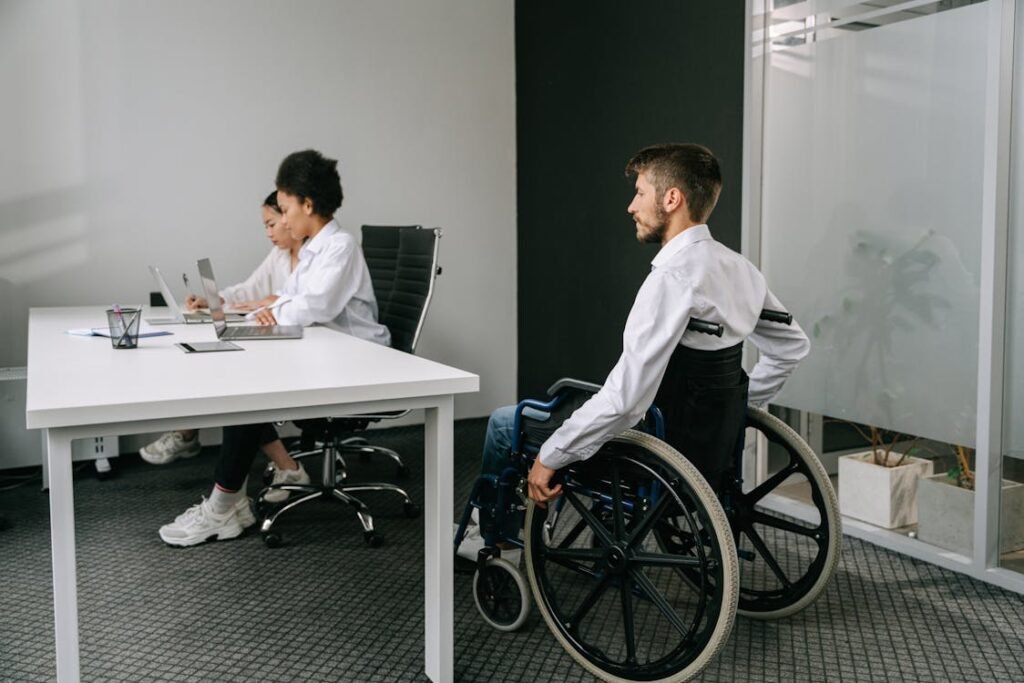Employees with disabilities in India have the right to workplace accommodations that allow them to work effectively and with dignity. However, many individuals are unaware of their rights or struggle to navigate the process of requesting these accommodations. While Indian labor laws, particularly the Rights of Persons with Disabilities (RPwD) Act, 2016, mandate equal opportunities in employment, implementation often depends on how well employees understand their rights and how effectively they communicate their needs to employers.
Workplace accommodations are not favors granted by employers—they are legal entitlements that ensure a fair and inclusive work environment. Whether it is flexible work hours, assistive technology, accessible office spaces, or modified job responsibilities, accommodations are designed to help employees with disabilities perform their jobs without unnecessary barriers.
The process of securing these accommodations requires a clear understanding of legal protections, employer obligations, and best practices for making requests. This article will guide employees with disabilities, HR professionals, and business owners through the steps to secure workplace accommodations under Indian labor laws, ensuring that inclusion is not just a policy but a lived reality in the workplace.

Understanding Your Legal Rights to Workplace Accommodations
The Rights of Persons with Disabilities (RPwD) Act, 2016
The Rights of Persons with Disabilities (RPwD) Act, 2016 is the primary law in India that protects the rights of employees with disabilities.
It mandates that workplaces must provide “reasonable accommodations” to ensure that employees with disabilities have equal opportunities to work.
The law covers private companies, government offices, and public sector enterprises, making it one of the most comprehensive protections for disabled employees in India.
Under this law, reasonable accommodations refer to necessary modifications and adjustments that do not impose an “undue burden” on the employer.
This means that as long as the requested accommodation is practical and does not create excessive difficulty for the business, the employer is legally required to provide it. The law explicitly states that denying reasonable accommodations is a form of discrimination.
The RPwD Act also requires companies with 20 or more employees to implement non-discriminatory policies and make their workplaces accessible.
This means that employees with disabilities should be able to work without barriers related to infrastructure, technology, or work processes.
The Role of the Equal Opportunity Policy
The RPwD Act mandates that all private and public organizations with 20 or more employees must have an Equal Opportunity Policy (EOP).
This policy should outline how the company supports employees with disabilities, including hiring practices, workplace accommodations, and grievance redressal mechanisms.
Employers must display this policy prominently in the workplace and submit it to the Chief Commissioner for Persons with Disabilities.
Employees should familiarize themselves with their company’s Equal Opportunity Policy, as it often contains details on how to formally request accommodations. If an organization does not have this policy in place, employees can legally demand that it be implemented.
Accessibility and Non-Discrimination Under Indian Labor Laws
Beyond the RPwD Act, other labor laws in India emphasize workplace accessibility and non-discrimination. The Factories Act, 1948, for example, requires companies to ensure safe and comfortable working conditions, which extends to employees with disabilities.
Similarly, the Labour Codes that are being introduced aim to make workplaces more inclusive and supportive of diverse needs.
Government and public sector jobs also follow the Reservation Policy, which reserves 4% of government jobs for persons with disabilities.
Private companies, while not required to meet reservation quotas, are still legally obligated to provide an accessible work environment and reasonable accommodations.
The Role of the Chief Commissioner for Persons with Disabilities
If an employer refuses to provide reasonable accommodations, employees can escalate the issue by filing a complaint with the Chief Commissioner for Persons with Disabilities (CCPD).
The CCPD is responsible for monitoring the implementation of disability rights laws and ensuring that employers follow inclusive policies.
Employees who face discrimination or denial of accommodations can file a grievance with the CCPD, which has the authority to investigate and direct employers to take corrective action.
Knowing that legal support is available can empower employees to assert their rights confidently.

How to Request Workplace Accommodations Effectively
Preparing to Make a Request
Employees seeking workplace accommodations should begin by understanding their specific needs and how these adjustments will help them perform their job effectively.
Before approaching an employer, it is useful to assess the tasks that present challenges and identify the modifications that would improve productivity and comfort.
This could include assistive technology, adjustments to work schedules, physical modifications to the workspace, or alternative methods of communication.
It is important to document the need for accommodations clearly. If a medical condition or disability requires adjustments, having medical records, recommendations from healthcare professionals, or occupational therapists can strengthen the request.
While employees are not legally required to disclose all medical details, providing relevant information can help employers understand the necessity of the requested changes.
Employees should also review their company’s Equal Opportunity Policy if available. Many organizations have a formal process for requesting accommodations, and understanding these steps can make the process smoother.
If the company does not have a structured procedure, employees can still make a formal request in writing to their supervisor or HR department.
Communicating the Request to Employers
When approaching an employer, it is beneficial to frame the request in a way that highlights how the accommodation will enhance work performance and contribute to overall productivity.
Employers may be more receptive when they see that providing accommodations is not just a legal obligation but also a practical way to ensure an efficient and engaged workforce.
A clear, concise written request is often the best way to initiate the process. This request should include the specific accommodation needed, the reason for it, and any supporting documents that validate the necessity of the modification.
Employees should also be prepared to discuss possible alternatives in case the original request cannot be fully met. Open dialogue and a willingness to collaborate can lead to a better outcome for both the employee and employer.
If an employer is hesitant, employees can remind them that under Indian labor laws, providing reasonable accommodations is a legal requirement.
Employers cannot deny a request based on personal biases or assumptions about the employee’s abilities.
However, if an employer claims that providing the accommodation would cause undue hardship to the company, the discussion can shift to exploring alternative solutions that meet both parties’ needs.
Following Up on the Accommodation Request
Once a request has been submitted, it is essential to follow up with the employer or HR department to ensure that it is being processed.
Some companies may require time to assess the feasibility of the request, but there should be a clear timeline for response. Employees should keep records of all communication related to the request, including emails, meeting notes, and responses from the employer.
If an employer agrees to provide accommodations, employees should ensure that the modifications are implemented correctly and that they address the intended challenges.
In some cases, adjustments may need fine-tuning, and regular feedback can help improve their effectiveness. Employers should also check in with employees periodically to see if additional modifications are needed over time.
If a request is denied without a valid reason, employees have the right to escalate the issue.
Speaking with senior management, engaging with the company’s internal grievance redressal committee, or seeking legal guidance from disability rights organizations can help in cases where an employer is unwilling to comply.
If necessary, a formal complaint can be filed with the Chief Commissioner for Persons with Disabilities, who has the authority to intervene and ensure compliance with the law.

Addressing Employer Concerns and Overcoming Resistance
Understanding Employer Hesitations
While Indian labor laws mandate workplace accommodations, some employers hesitate to implement them due to concerns about cost, feasibility, or impact on overall business operations.
Many employers assume that accommodations are expensive or difficult to implement, when in reality, most adjustments require minimal investment and yield long-term benefits.
Understanding these hesitations can help employees navigate discussions more effectively and present accommodations as a practical solution rather than a burden.
Some employers worry that granting accommodations to one employee will set a precedent, leading to a flood of similar requests. Others may fear that making changes will disrupt workflow or create resentment among other employees.
These concerns often stem from a lack of awareness about disability rights and the reality of workplace adjustments.
Employees can address these issues by providing evidence of how accommodations improve productivity, boost morale, and create a more inclusive work environment.
Presenting the Business Case for Accommodations
One of the most effective ways to overcome employer resistance is to highlight how workplace accommodations benefit not just employees with disabilities but the organization as a whole.
Employees who receive the necessary support are more engaged, efficient, and loyal to the company, reducing turnover rates and increasing overall team performance.
Studies have shown that inclusive workplaces experience higher innovation, better problem-solving, and stronger employee satisfaction.
Employers should also understand that accessibility benefits extend beyond employees with disabilities. For example, ergonomic furniture, flexible work hours, and digital accessibility improvements make the workplace more comfortable and user-friendly for everyone.
Many workplace accommodations, such as speech-to-text software or adjustable desks, improve overall productivity for all employees.
Additionally, businesses that prioritize accessibility enhance their reputation in the industry.
Companies known for their inclusive practices attract top talent, strengthen their brand image, and are more likely to be considered for government contracts and partnerships with global corporations that value diversity and inclusion.
Offering Practical Solutions to Ease Employer Concerns
If an employer is reluctant to approve a request due to concerns about feasibility, employees can propose solutions that make implementation easier.
For instance, if the company is concerned about the cost of a specific assistive technology, employees can present alternative, budget-friendly options or suggest government funding programs that support workplace accessibility.
In cases where employers are unsure how to implement accommodations, employees can recommend consulting with disability organizations, accessibility experts, or government agencies that specialize in workplace inclusion.
The Chief Commissioner for Persons with Disabilities (CCPD) and various NGOs in India offer guidance on cost-effective and legally compliant ways to accommodate employees with disabilities.
Employers may also appreciate trial periods for certain accommodations to assess their impact before making permanent adjustments. This approach reassures businesses that changes can be evaluated and modified if needed, reducing concerns about long-term disruption.
Encouraging a Shift in Workplace Mindset
Changing workplace attitudes toward disability inclusion requires continuous education and advocacy.
Employees and HR teams can encourage organizations to provide disability awareness training for managers and coworkers, ensuring that all employees understand the importance of accessibility.
When employers see real-life examples of successful accommodations, they are more likely to adopt inclusive practices across the organization.
Ultimately, employees seeking accommodations should approach discussions with confidence, knowing that the law is on their side.
A well-prepared request, supported by clear reasoning, legal backing, and practical solutions, significantly increases the chances of obtaining necessary workplace modifications.

What to Do If Your Accommodation Request Is Denied
Understanding Why Requests Are Rejected
While Indian labor laws require employers to provide reasonable accommodations, some companies deny requests, either due to a lack of awareness or unwillingness to make adjustments.
When a request is denied, employees must first understand the reason behind the rejection. Employers may claim that the accommodation is too costly, that it will disrupt business operations, or that it is unnecessary for the employee’s role.
In some cases, employers may not understand their legal obligations under the Rights of Persons with Disabilities (RPwD) Act, 2016.
Others may fear setting a precedent that leads to similar requests from other employees. Whatever the reason, it is important for employees to stay calm and approach the situation strategically.
If an employer argues that an accommodation would cause “undue hardship” to the company, the employee has the right to request a detailed explanation.
The law defines undue hardship as a significant difficulty or expense, not just minor inconveniences or budget concerns.
Employers must demonstrate how the request would negatively impact operations and explore alternative solutions before outright denying an accommodation.
Steps to Take After a Denial
When an accommodation request is denied, the next step is to open a discussion with HR or senior management.
Many accommodation denials are based on misunderstandings or incomplete information, and clarifying the necessity of the request can often lead to a positive outcome.
Employees should present additional supporting documents, such as medical recommendations or industry best practices, to strengthen their case.
If direct discussions with HR do not lead to a resolution, employees should formally escalate the issue through the company’s internal grievance mechanism.
Many companies, especially those with Equal Opportunity Policies, have designated procedures for handling disputes related to workplace accommodations. Filing a formal complaint within the company ensures that the request is documented and reviewed by senior leadership.
If an internal resolution is not possible, employees have the right to file a complaint with the Chief Commissioner for Persons with Disabilities (CCPD).
The CCPD has the authority to investigate cases of discrimination, issue directives to employers, and ensure compliance with disability laws. Employees can submit complaints online or through regional disability commissioners, who will assess the case and take appropriate action.
Seeking Legal Assistance and External Support
In situations where an employer continues to deny reasonable accommodations, employees can seek legal support. Disability rights organizations, labor unions, and legal aid services in India offer assistance to employees who face discrimination in the workplace.
The National Centre for Promotion of Employment for Disabled People (NCPEDP) and other advocacy groups help individuals navigate legal processes and hold employers accountable.
Employees who believe their rights have been violated can also approach labor courts or human rights commissions for further action. Legal intervention is often a last resort, but it is an important option for employees facing persistent workplace discrimination.
The Importance of Persistence and Self-Advocacy
Securing workplace accommodations often requires persistence, especially in organizations that are unfamiliar with disability rights.
Employees should advocate for themselves confidently, knowing that they are protected by law.
By remaining proactive, seeking external support when needed, and using legal protections effectively, employees with disabilities can ensure that their workplaces become more accessible and inclusive.

The Role of Employers in Creating an Accessible Workplace
Building a Proactive Approach to Workplace Accommodations
Employers play a critical role in ensuring that workplace accommodations are not just reactive measures but a standard part of organizational policies.
Instead of waiting for employees with disabilities to request modifications, businesses should proactively assess their work environments and identify areas where accessibility improvements can be made.
A forward-thinking approach begins with a workplace accessibility audit. Employers can conduct assessments to evaluate physical office spaces, digital tools, and work policies to determine whether they meet the needs of employees with disabilities.
Consulting with accessibility experts, disability rights organizations, or employees with lived experiences can provide valuable insights into necessary improvements.
By implementing inclusive infrastructure, assistive technology, and flexible work policies in advance, companies create an environment where employees with disabilities feel welcomed from day one.
When accommodations are built into the workplace structure, employees do not have to go through long and complicated processes to receive the support they need.
Creating a Disability-Inclusive Hiring and Onboarding Process
Many individuals with disabilities never get the chance to request workplace accommodations because they struggle to get hired in the first place.
Biases in hiring processes, inaccessible application systems, and inflexible interview structures create barriers for job seekers with disabilities. Employers must ensure that their recruitment processes are designed to be inclusive.
Job descriptions should focus on the essential skills and responsibilities of the role, rather than unnecessary physical requirements.
Online application systems should be accessible to screen readers and assistive technologies, allowing visually impaired candidates to apply without difficulty.
Interviews should be flexible, with alternative formats such as video calls, written assessments, or structured trials for candidates who may require different ways to showcase their skills.
Once hired, employees with disabilities should go through an onboarding process that is tailored to their needs.
Employers should have discussions with new hires about any accommodations they may require and ensure that accessibility measures are in place before their first day of work. An inclusive onboarding experience sets the tone for a supportive and welcoming workplace.
Training Managers and Employees on Disability Inclusion
One of the biggest barriers to workplace accessibility is a lack of awareness among managers and coworkers.
Many employees with disabilities hesitate to request accommodations because they fear negative perceptions or misunderstandings from their colleagues. Employers can prevent this by conducting regular disability inclusion training sessions.
Training programs should educate managers on their legal responsibilities, best practices for supporting employees with disabilities, and strategies for implementing accommodations effectively.
Employees should also be made aware of inclusive communication practices, workplace etiquette, and ways to create a supportive team environment.
By normalizing conversations around disability and workplace accessibility, businesses can remove stigma and foster a culture where accommodations are seen as a standard part of employment rather than an exception.
Measuring the Impact of Workplace Accommodations
To ensure that workplace accommodations are effective, companies should track their impact on employee performance, retention, and overall workplace satisfaction.
Anonymous employee feedback surveys can help businesses identify areas for improvement and refine their policies over time.
Regular accessibility reviews should be conducted to keep up with advancements in technology and evolving workplace needs.
As more businesses embrace hybrid and remote work models, digital accessibility is becoming just as important as physical accessibility. Companies that stay ahead of these changes will be better positioned to attract and retain diverse talent.
By actively prioritizing workplace accommodations and inclusion, employers do not just comply with Indian labor laws—they create work environments where all employees can thrive, innovate, and contribute to the company’s success.

The Role of Government and Industry in Strengthening Workplace Accessibility
Government Initiatives Supporting Workplace Accommodations
While Indian labor laws mandate reasonable accommodations for employees with disabilities, government initiatives play a crucial role in helping businesses implement these changes effectively.
Programs such as the Accessible India Campaign (Sugamya Bharat Abhiyan) have raised awareness about accessibility in public and private spaces, pushing businesses to adopt inclusive practices.
The government has also introduced financial incentives, tax benefits, and grants to encourage companies to make their workplaces more accessible.
The National Action Plan for Skill Development of Persons with Disabilities (Divyangjan) focuses on training individuals with disabilities to enhance their employability.
Employers who collaborate with this initiative gain access to a skilled talent pool and receive guidance on creating inclusive workplaces.
Additionally, the Department of Empowerment of Persons with Disabilities (DEPwD) provides resources and guidelines on workplace accommodations, ensuring that companies have the necessary support to comply with the law.
Public sector enterprises are required to follow strict accessibility guidelines under government regulations, but private companies also stand to benefit by aligning with these policies.
Organizations that proactively implement accommodations may qualify for government projects, funding, and business partnerships that prioritize inclusion.
Industry Collaboration for Accessibility Standards
Beyond government efforts, the private sector has a responsibility to set industry-wide standards for workplace accessibility.
Many multinational corporations operating in India have already adopted global best practices, making it easier for businesses of all sizes to follow suit.
By collaborating with industry leaders, startups, and disability inclusion organizations, Indian companies can accelerate accessibility improvements.
Business associations and industry bodies, such as the Confederation of Indian Industry (CII) and National Association of Software and Service Companies (NASSCOM), are increasingly focusing on diversity and inclusion.
These organizations offer training programs, certification courses, and advisory services to help companies build accessible work environments.
Additionally, multinational companies that operate in India often have strong accessibility policies due to global compliance standards like the United Nations Convention on the Rights of Persons with Disabilities (UNCRPD).
By learning from these corporations and adapting their best practices, Indian businesses can integrate accessibility into their corporate culture.
Encouraging More Businesses to Adopt Inclusive Policies
For workplace accommodations to become a norm rather than an exception, a shift in mindset is needed at both the corporate and societal levels.
Industry leaders can influence this change by publicly sharing their success stories and demonstrating how accessibility benefits both employees and businesses.
Case studies highlighting companies that have successfully implemented workplace accommodations can serve as models for other organizations looking to improve inclusion.
Employers who champion disability rights can inspire competitors and partners to follow their lead, creating a ripple effect across industries.
Ultimately, workplace accessibility should not be viewed as a legal requirement alone—it should be seen as a business advantage, a marker of social responsibility, and a commitment to building a more inclusive and equitable workforce.
When government bodies, industry leaders, and businesses work together, workplace accommodations become a standard part of employment, ensuring that every individual has the opportunity to contribute meaningfully.
Conclusion
Workplace accommodations are not just a legal requirement under Indian labor laws—they are essential for creating a fair, productive, and inclusive work environment. Employees with disabilities have the right to request reasonable modifications that enable them to perform their jobs effectively, and employers have a responsibility to provide these adjustments without discrimination.
With the Rights of Persons with Disabilities (RPwD) Act, 2016 ensuring equal opportunities, businesses must go beyond compliance and actively work toward accessibility. By implementing flexible policies, leveraging assistive technology, and fostering an inclusive culture, companies can unlock the full potential of their workforce.
Government initiatives, industry collaborations, and corporate best practices are shaping a future where accessibility is the norm rather than the exception. Employers who embrace workplace accommodations gain a competitive advantage, attract top talent, and build stronger, more diverse teams.
The path to full workplace accessibility requires awareness, persistence, and collaboration. Employees should confidently advocate for their rights, while businesses must recognize that accessibility is an investment in long-term success. A truly inclusive workplace benefits everyone—not just individuals with disabilities, but the entire organization.



